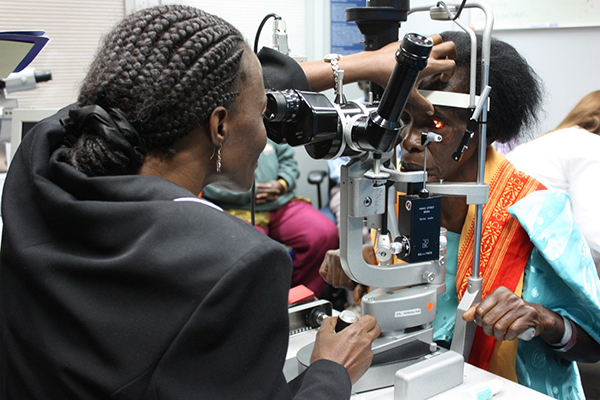What is uveitis?
Uveitis is inflammation inside your eye. Inflammation usually happens when your immune system is fighting an infection. Sometimes uveitis means your immune system is fighting an eye infection — but it can also happen when your immune system attacks healthy tissue in your eyes. Uveitis can cause problems like pain, redness, and vision loss.
Uveitis damages the part of the eye called the uvea — but it often affects other parts of the eye, too. Sometimes uveitis goes away quickly, but it can come back. And sometimes it’s a chronic (long-term) condition. It can affect 1 eye or both eyes.
Uveitis can cause vision loss if it isn’t treated — so it’s important to see your eye doctor right away if you have symptoms.
What is the uvea?
The uvea is the middle layer of the eye between the sclera (white part of the eye) and the retina (light-sensitive layer at the back of the eye). It has 3 parts:
Iris (the colored part of the eye)
Ciliary body (the part of the eye that helps the lens focus)
Choroid (the part of the eye that connects the retina to the sclera)
What are the types of uveitis?
Different types of uveitis affect different parts of the eye.
Anterior uveitis affects the iris at the front of the eye. It’s the most common type, and it’s usually less serious.
Intermediate uveitis affects the ciliary body and the vitreous (gel-like fluid that fills the eye).
Posterior uveitis affects the retina and the choroid at the back of the eye.
Panuveitis affects all parts of the uvea, from the front to the back of the eye.
What are the symptoms of uveitis?
Early uveitis symptoms usually start suddenly. Symptoms include:
Blurry vision
Floaters (small dark spots or squiggly lines that float across your vision)
Eye pain
Red eyes
Sensitivity to light
If you notice these symptoms, see your eye doctor right away. Uveitis can cause vision loss if you don’t treat it.
Am I at risk for uveitis?
Anyone can get uveitis, but it’s most common in people ages 20 to 60.
You’re at higher risk for uveitis if you smoke cigarettes.
What causes uveitis?
Doctors don’t always know what causes uveitis, but there are several known causes.
Sometimes uveitis is caused by autoimmune diseases, like:
AIDS
Ankylosing spondylitis
Behcet’s disease
Lupus
Multiple sclerosis
Psoriasis
Rheumatoid arthritis
Sarcoidosis
Ulcerative colitis
Vogt-Koyanagi-Harada (VKH) disease
Sometimes it’s caused by an infection or a condition related to an infection, like:
Cytomegalovirus (CMV) retinitis
Histoplasmosis
Reactive arthritis
Shingles
Syphilis
Toxoplasmosis
Uveitis can also be caused by cancers that can affect the eye, like lymphoma.
How will my eye doctor check for uveitis?
Eye doctors can check for uveitis as part of a dilated eye exam. The exam is simple and painless — your doctor will give you some eye drops to dilate (widen) your pupil and then check your eyes for uveitis and other eye problems.
Your doctor will also ask about your medical history — and may recommend some tests to see if you have an infection or another disease that can cause uveitis.
What’s the treatment for uveitis?
Medicines called steroids can reduce inflammation in your eye. This can ease symptoms and prevent vision loss. Your eye doctor may prescribe steroids in a few different ways:
Eye drops. Prescription eye drops are the most common treatment.
Pills. Your eye doctor may also prescribe steroids as a pill.
Injections. In some cases, your eye doctor might put the steroid in or around your eye with a small needle.
Implants. If other treatments don’t work, your doctor might suggest surgery to put a small device called an implant into your eye. The implant gives you regular small doses of the steroid over time.
Steroids can have side effects and can increase your risk for cataracts and glaucoma. If you take steroids for uveitis, it’s important to get regular eye exams to check for signs of these problems.
Your treatment plan will depend on several factors — like which part of your eye is affected, and other health conditions you have. For example, your doctor may prescribe medicines to help control your immune system. You can work with your doctor to find the right treatments for you.
